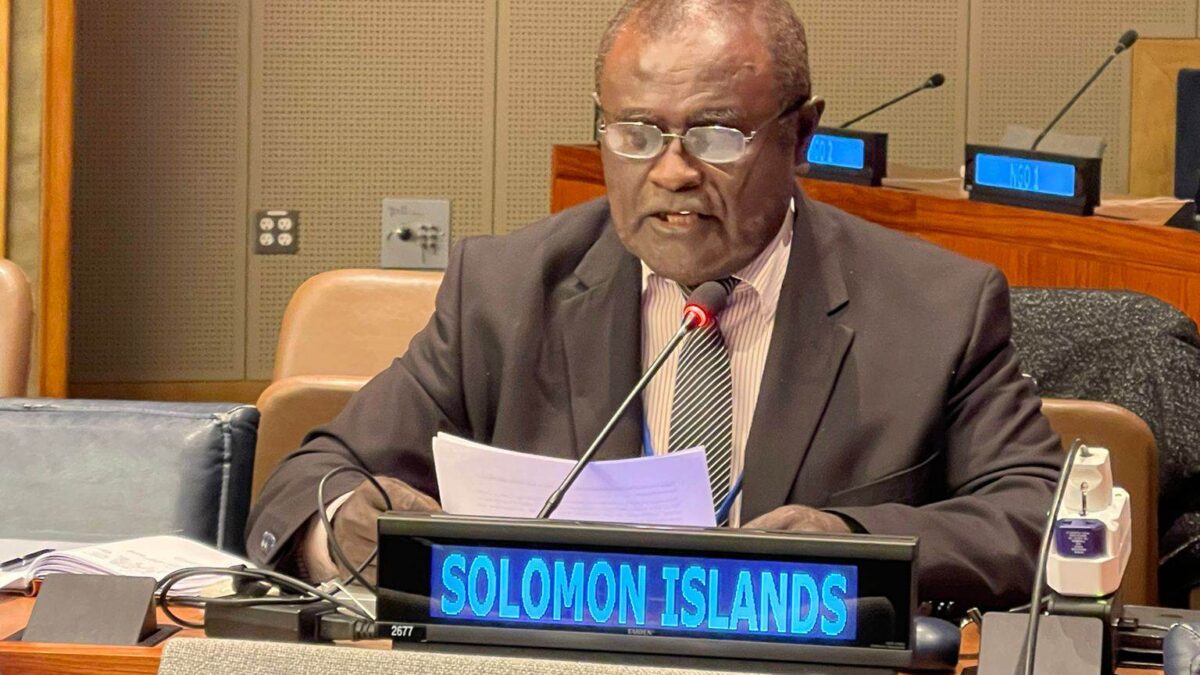

Permanent Secretary of the Ministry of Women, Youth, Children and Family Affairs Dr Cedrick Alependava delivering his country statement aligned to the Pacific Islands Forum Secretariat’s Statement at the Sixty-seventh Session of the United Nation Commission on the Status of Women in New York last week.
Promoting women’s economic empowerment digitally is a priority
Promoting women’s economic empowerment in this digital age is a priority for Solomon Islands government with a particular focus on women and girls in the informal market sector, who’s contribution to our economy most often go unrecognised and undocumented.
THE Permanent Secretary of the Ministry of Women, Youth, Children and Family Affairs Dr Cedrick Alependava made the remark in his country statement aligned to the Pacific Islands Forum Secretariat’s Statement at the Sixty-seventh Session of the United Nation Commission on the Status of Women in New York.
Permanent Secretary Alependava and Director of Women Development Division Vaela Falefehi Ngai have attended the event which ended successfully on Friday 17th March with the theme “Innovation and technological change, and education in the digital age for achieving gender equality and the empowerment of all women and girls”.
PS Alependava informed the Commission that the realities of Digital technology in the Solomon Islands especially for about 86 % of our women and girls in the rural and remote areas is still very much a challenge and, in most areas, is non- existent due to significant cultural, geographical and structural barriers.
He highlighted that there are only two telecommunications companies in the Solomon Islands and while the introduction of undersea cabling has somewhat improved access and connectivity, infrastructures in the rural and remote areas are largely missing.
He said Solomon Islands is a nation of about 900 to 1000 small islands, with a high dependency on agriculture, fishing, and forestry for livelihood and a small economic standing making us very vulnerable to internal and external shocks affecting the most, women, girls, children and other vulnerable groups.
“Ensuring gender equality while responding to these shocks has been very challenging, in light of our existing long list of challenges including limited resources and budgets.
He said affirmative actions must be adopted and applied to ensure the accelerated narrowing of the digital gap for women and girls and especially those in the rural and remote areas where the gap is the widest and there is a need for relevant researches and studies to help inform our efforts to narrow this gap.
The Permanent Secretary said that a key opportunity to ensure the legislation of the protection of women and girls from technology-facilitated gender-based violence is the drafting of our Cyber Crime Bill.
“Solomon Islands have made significant progress in addressing gender inequalities this past decade, and with these, we are confident that we have laid the necessary foundation to hopefully accelerate our address of this digital poverty or gap for women and girls.
He said this year’s theme while might be overwhelming and daunting, is a critical one, that we are committed to take steps to address and call on the significant support and resources, partnerships and collaborations that will be needed from donors, development partners and the private sector to ensure that we are not left behind while the whole world progresses ahead in this digital age.
“On the other hand, these pandemics and disasters have also helped us appreciate the benefits of digital technology.
He informed the Commission that Solomon Islands will continue to strive to bridge the digital divide between women and girls, to ensure priorities in line with the theme of the 67th Session on the Commission of Women and our Sustainable Development Goals and acknowledges the significant progresses that has been shared on the floor to advance gender equality in this digital age including those of fellow Pacific Islands Countries, despite the many challenges faced including the on-going threat of climate change to our Small Island States.
The Ministry of Women, Youth, Children and Family Affairs through its Women Development Division is committed to advance gender equality and women’s empowerment in the Solomon Islands through the implementation of the National Gender Equality and Women’s Development Policy (GEWD) with the support of its partners including its other gender frameworks.
MWYCFA Press